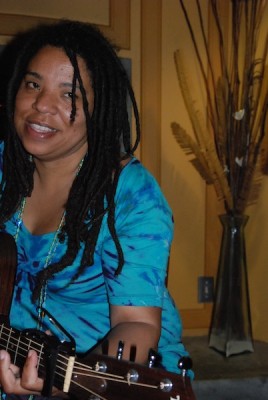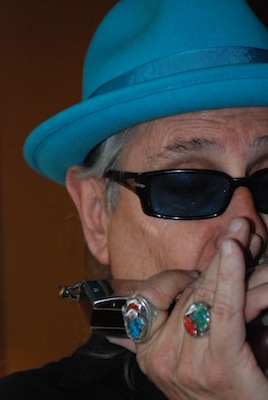The blues isn’t just about commercial success, radio play and international fame.
Sometimes, the blues is, well, the blues.
Sometimes it means no record deal, no fame, no well-paying gigs. That’s often when you find remarkable musicians in their dwelling place of obscurity, playing the pure, unadulterated old-time blues. Country blues musicians were always more used to street corners than concert halls. For every blues player “inside”, you had a hundred true folk musicians busking on the streets, playing to the people where they congregated. Back in the early to mid-1970s, when the blues still had a foothold in the black community, you could still see the real true blues singers like Flora Molton play for tips down on H Street in NE Washington, DC. Blind Connie Williams was playing with a tin cup in Philadelphia. Every town had its blues buskers making their money the hard way. Even today, the greatest surprises and unexpected musical treasures are found among those who glide under the radar of fame, whose life-circumstances have brought their music to coffee-houses, farmers markets and street corners. These are the places where some of the most beautiful folk blues is still sung by complete unknowns, where regular people are exposed to great music free of charge. This is where people, who would ordinarily never attend a blues show, get to hear this poignant and heartfelt music. This is where folk music is still exactly that.
 One of these obscure, but wonderful, artists is San Francisco Bay area singer Rabia Yamazawa, who goes by the name Reverend Rabia, as she is a minister in a new-age church, a fact too complicated to explore in a music article. Her blues carries an essential undercurrent of emotive turmoil. She is a raw, ethereal folk blues singer, yet with a sweet quality that immediately touches the heart. There is a kind of sadness in her singing, yet an uplifting warmth and a deep connection with the old spirituals that are very much part of her African-American heritage. Says Rev. Rabia, “I had a very strict upbringing. Mother loved blues, but my Father was raised to see the blues as ‘Devil’s Music’. My earliest memories are of mom hiding blues records and only listening while my dad was at work. My maternal grandfather also played guitar, but I did not know him until I was a teen.” Perhaps this perpetual conflict between the sacred and the profane led her to a lifetime of balancing the spiritual religious quest with a life in the blues, both musically and personally. Her life was no bed of roses, a true blues story.
One of these obscure, but wonderful, artists is San Francisco Bay area singer Rabia Yamazawa, who goes by the name Reverend Rabia, as she is a minister in a new-age church, a fact too complicated to explore in a music article. Her blues carries an essential undercurrent of emotive turmoil. She is a raw, ethereal folk blues singer, yet with a sweet quality that immediately touches the heart. There is a kind of sadness in her singing, yet an uplifting warmth and a deep connection with the old spirituals that are very much part of her African-American heritage. Says Rev. Rabia, “I had a very strict upbringing. Mother loved blues, but my Father was raised to see the blues as ‘Devil’s Music’. My earliest memories are of mom hiding blues records and only listening while my dad was at work. My maternal grandfather also played guitar, but I did not know him until I was a teen.” Perhaps this perpetual conflict between the sacred and the profane led her to a lifetime of balancing the spiritual religious quest with a life in the blues, both musically and personally. Her life was no bed of roses, a true blues story.
Rev. Rabia grew up in an abusive home, living in fear of her father, in what she describes as a “difficult, abusive upbringing”. She escaped into the blues and jazz, especially Sarah Vaughn and Koko Taylor. She started playing guitar at age 14, when a few friends taught her a few chords and loaned her a guitar. Like many teens in her situation, she escaped her home by getting pregnant too soon, and her life was one of struggle and hardships. She eventually married and tried her luck in the SF bay area singer/songwriter circuit. She also joined the Oakland Jazz Choir for about a year. Eventually, she committed to the blues and studied blues guitar with Kenny “Blue” Ray.

The highlight of her musical career was singing with the great county bluesmen Virgil Thrasher and Robert Lowery, a period which Rev. Rabia described as “ …the major turning point of me as performer. They really took me under their wings and helped me record my first CD. The CD did really well with positive reviews in Blues Access and Living Blues, as well as several European magazines. That also put me on the blues festival circuit, and eventually landed me in The San Francisco Blues Festival, and several local festivals. I also toured southern Italy with Sonny Rhodes (2005).”
The opportunity to play with such folk blues luminaries as Robert Lowery and Virgil Trasher was not enough to catapult her career. Today, she is occasionally sings with an electric blues band and often performs solo acoustic blues in local farmer’s markets. She is married to photographer Keizo Williams Yamazawa, whose photos adorn this article.
Her delightful, self-produced CD “Never Too Late” features Virgil Trasher on harmonica, but unfortunately it is not presently commercially available. Hopefully, Rev. Rabia will reissue it, or offer other means for deprived audiences to hear and access her music. As it is, here is a brilliant unsung artist who will be hard to find, but remains a living treasure of the folk blues.

Pingback: New Artist Profile « The Country Blues
Comments are closed.